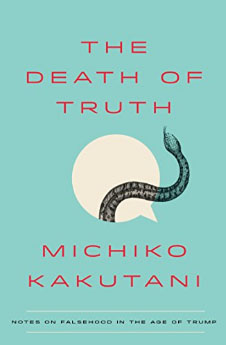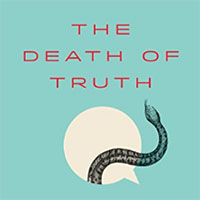— from Jens Kruse —
 Michiko Kakutani – the Pulitzer Prize winning recently retired chief literary critic of the New York Times – has written a book that is absolutely essential reading for our times.
Michiko Kakutani – the Pulitzer Prize winning recently retired chief literary critic of the New York Times – has written a book that is absolutely essential reading for our times.
In the introduction of The Death of Truth: Notes on Falsehood in the Age of Trump (New York: Tim Duggan Books, 2018), Kakutani asks these questions:
“How did this happen? What are the roots of falsehood in the Trump era? How did truth and reason become such endangered species, and what does their impending demise portend for our public discourse and the future of our politics and governance? That is the subject of this book.” (15)
In the nine lucid chapters that follow these questions and that announcement, she traces the decades-long developments in our culture and body politic that have brought us to our current predicament. The titles of her chapters spell out these forces and developments: “The Decline and Fall of Reason;” “The New Culture Wars;” “ ‘Moi’ and the Rise of Subjectivity;” “The Vanishing of Reality;” “The Co-opting of Language;” “Filters, Silos, and Tribes;” “Attention Deficit;” “ ‘The Firehose of Falsehood’: Propaganda and Fake News;” “The Schadenfreude of the Trolls.”
Whether she traces the ways in which the academic infatuation with postmodern deconstructionism went mainstream and appeared to support the relativizing of facts and truth; whether she explains how the culture of narcissism, the “Me” decade, and the prioritization of personal subjective experience over empiricism and the objectivity of science undermined the foundations of shared facts and rational discourse; whether she develops how our political polarization and the concomitant polarization of our media landscape, the echo chambers and “one-way mirrors” (117) of our search engines and social media feeds increasingly sort us into silos and bubbles: in all these aspects and more, Kakutani guides the reader effectively, lucidly, elegantly, and passionately.
In what is structurally and thematically the central chapter of her book, chapter 5 on “The Co-opting of Language,” Kakutani starts by quoting George Orwell’s insight that “political chaos is connected with the decay of language” (from his essay “Politics and the English Language”). What follows is a tour de force through the techniques of co-opting language used by totalitarian regimes fictional (in Orwell’s 1984) and all too real, like Mao’s China, Stalin’s Soviet Union and Hitler’s Germany. But she makes it very clear that her argument is not, or not only, historical; it is about this, our current moment. And with that it is about Trump’s and his administration’s mendacity. She writes:
“Trump’s assault on language is not confined to his torrent of lies, but extends to his taking of words and principles intrinsic to the rule of law and contaminating them with personal agendas and political partisanship. In doing so, he’s exchanged the language of democracy and its ideals for the language of autocracy. “ (94)
Kakutani’s nearly four decades of book reviewing undergird her analysis and argument as she gives us thumbnail summaries of relevant books and texts such as Lincoln’s 1838 Lyceum Address, Hannah Arendt’s The Origins of Totalitarianism, George Orwell’s 1984, Stefan Zweig’s The World of Yesterday, Tom Nichols’ The Death of Expertise, Victor Klemperer’s The Language of the Third Reich, and many more.
Kakutani opens the culminating paragraph of her “Introduction” with the statement that “[t]ruth is a cornerstone of our democracy” (19). She concludes her “Epilogue” by quoting George Washington’s Farewell Address of 1796 and Thomas Jefferson’s Inaugural Address, stressing the “roof of democracy: the three branches of government” (171) and the “two foundation stones” (172), “education and a free and independent press” (172). She ends her book with these memorable words:
“Without commonly agreed-upon facts – not Republican facts and Democratic facts; not the alternative facts of today’s silo world – there can be no rational debate over policies, no substantive means of evaluating candidates for political office, and no way of holding elected officials accountable to the people. Without truth, democracy is hobbled. The founders recognized this, and those seeking democracy’s survival must recognize it today.” (172-73)
The Death of Truth: Notes on Falsehood in the Age of Trump can be checked out from the Orcas Library. It is available through Darvill’s Bookstore. If you have time to read only one book in the coming month this should be it.
P.S. Michiko Kakutani dedicates her book to “journalists everywhere working to report the news.”
**If you are reading theOrcasonian for free, thank your fellow islanders. If you would like to support theOrcasonian CLICK HERE to set your modestly-priced, voluntary subscription. Otherwise, no worries; we’re happy to share with you.**









Great review, Jens! Sounds like a must-read.
Thanks, David. I think it is. And it is only 173 small text pages. Also — and this sounds weird, given the topic — it is a pleasure to read because it is so well written. Jens
I concur…great review Jens!!!- thank you for writing it.
This must read shows the political/cultural trends toward irrational thinking processes certainly preceded Trump but have been amplified greatly by his hyperbolic and ad-hoc approach to all matter of data and discourse.
The derision reserved for objective/empirical evidence from all sides of the political and cultural divide has created a feeding frenzy of miscomprehension and distorted, context-free knowledge- a virtual descent towards the lowest common denominator as “moral equivalency” is now wielded as a weapon to bludgeon “reason” out of existence—rendering those who consider rational thought a central pillar of civilization alone and isolated.
That’s dangerous!